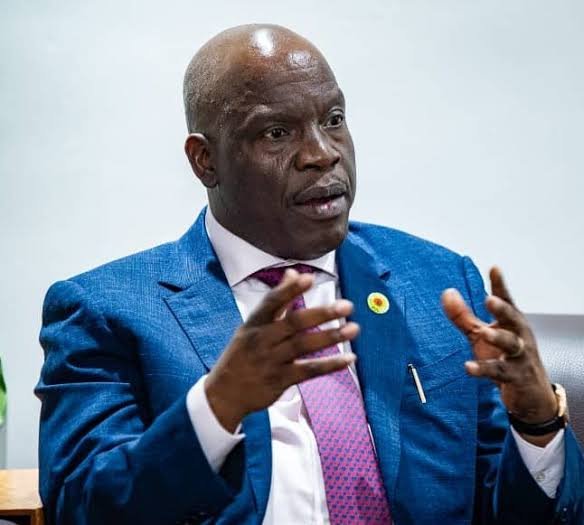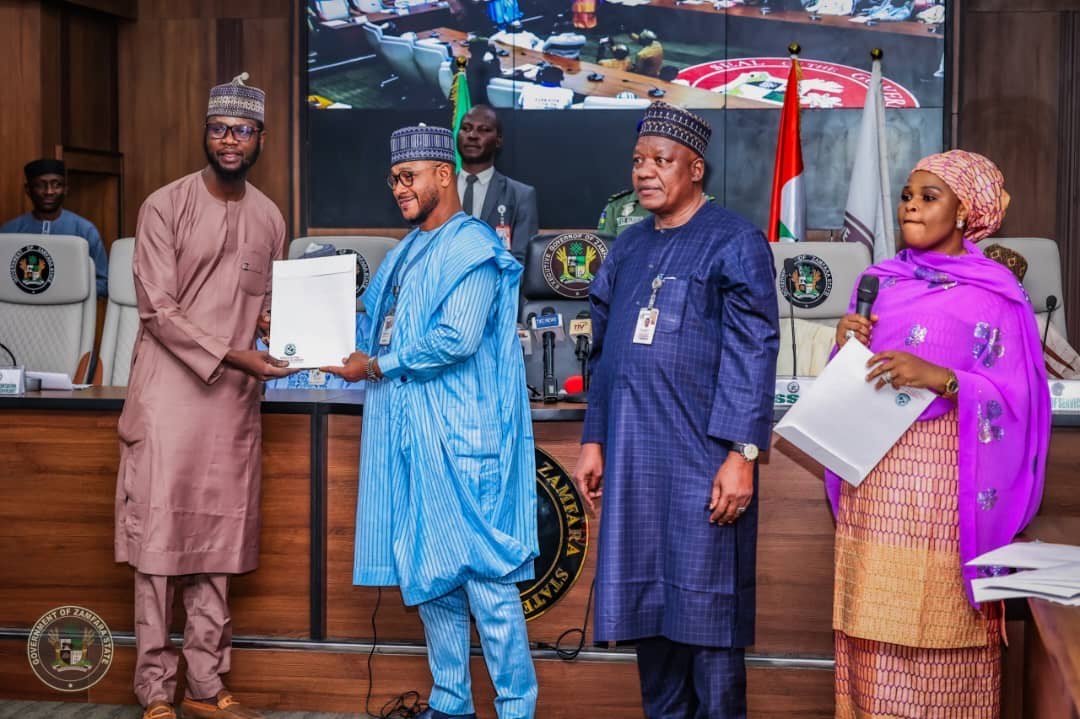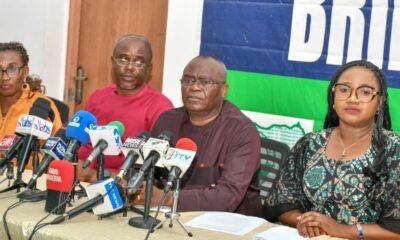News
NUPRC Boss Komolafe Puts Nigeria on Global Energy Map, Earns Praise Ahead of London Awards

The Nigerian Upstream Petroleum Regulatory Commission (NUPRC) and its Chief Executive, Engr. Gbenga Komolafe, have received nominations in two key categories at the 2025 Africa Energies Summit Awards, set to hold on May 15 in London.
The Commission is shortlisted for the Rhino Award, which honours Africa’s top-performing regulators or national oil companies, while Komolafe is nominated for the Elephant Award, which recognises individuals making significant contributions to the continent’s energy advancement.
In response to the nominations, a civil society group, the Alliance for Sustainable Energy Governance in Africa (ASEGA), commended Komolafe for the recognition, describing it as “a timely affirmation of Nigeria’s evolving stature in Africa’s energy sector”.
ASEGA, which describes itself as a network of professionals, researchers, and community-based advocates focused on energy governance, said the nominations underscore the progress made by the NUPRC under Komolafe’s leadership since its creation in 2021.
“The nomination of Engr. Komolafe and the Commission points to one thing: strategic, consistent reform works,” said Alhaji Ibrahim Bello Kura, the coalition’s national president, in a statement on Tuesday.
“It reflects a growing perception that Nigeria’s upstream sector is now more transparent, more predictable, and far more efficient than it was just four years ago.”
During his Senate screening in 2021, Komolafe pledged to build “a 21st-century regulator and the leading upstream regulator in Africa.” ASEGA said the nominations were evidence that this vision is being realised.
“At the time of his Senate clearance, many may have viewed his ambition as aspirational. But today, there is measurable progress. From data-driven regulation to investor confidence and better governance mechanisms, the NUPRC has set a new standard,” the coalition said.
ASEGA added that the recognition at a continental event with global visibility highlights how Nigerian institutions can gain respect through impactful reforms.
“We now have an upstream regulator that others across Africa are studying, not out of courtesy, but out of a need to replicate results,” the group noted.
“These awards go beyond prestige. They recognise how the NUPRC has translated complex mandates into clear outcomes. They validate the argument that public institutions can be effective and respected, if properly led.”
The coalition credited Komolafe’s leadership for the agency’s upward trajectory.
“What we’re seeing is the outcome of stable, focused leadership. This nomination does not belong to one individual, but Komolafe’s role in establishing institutional direction cannot be overstated.”
ASEGA also referenced the Commission’s recent data on hydrocarbon reserves, which it said show improved sector confidence.
In 2025, NUPRC reported oil reserves of 37.24 billion barrels and gas reserves of 210.5 trillion cubic feet, with a projected reserve life of 64 and 93 years respectively. The Commission also launched initiatives aimed at raising Nigeria’s oil production by one million barrels per day.
“Statistical improvements alone don’t tell the full story. But when you connect those figures to regulatory actions, you see a pattern of deliberate policy execution. That’s what’s being recognised in London.”
According to ASEGA, the global nature of the summit makes the nominations particularly meaningful.
“This is not just a local commendation. These are peers and observers from across Africa and the global energy space. When they choose to nominate a Nigerian regulator and its chief executive, that sends a signal.”
The coalition urged the Commission to stay focused on long-term institutional reforms rather than see the recognition as an endpoint.
“There’s still more work ahead. But this shows that the direction is right,” ASEGA added.
The Africa Energies Summit, now in its 29th edition, is expected to convene energy leaders, regulators, and policymakers from across the continent.
Other nominees for the Rhino Award include PETROCI (Côte d’Ivoire), ANPG (Angola), ANP-STP (São Tomé and Príncipe), SMH (Mauritania), and PETROSEN (Senegal). Komolafe joins a shortlist for the Elephant Award that includes senior officials from ExxonMobil, Angola’s ANPG, Uganda’s Petroleum Authority, and Madagascar’s OMNIS.
The awards will feature keynote addresses from Gayle Meikle, CEO of Frontier, and Maggy Shino, Petroleum Commissioner of Namibia, among others.
News
Federal fire service decorates 130 officers in Kano

The Kano State Command of the Federal Fire Service (FFS) has decorated 130 officers recently promoted to various ranks in a ceremony held in Kano.
The Command’s Controller in the state, Kazeem Sholadoye disclosed this in a statement issued by the service’s Public Relations Officer, Al-Hassan Kantin on Wednesday in Kano.
Congratulating the officers, the state controller described their promotion as well deserved and a call to greater responsibility and professionalism.
Sholadoye charged the officers to see their new ranks as an opportunity to demonstrate increased commitment to protection of lives and property.
He reminded them that promotion comes with higher expectations in service delivery.
Speaking on behalf of the promoted officers, Deputy Superintendent of Fire in the command, DSF Abdullahi Muhammad expressed appreciation to the management for organising what he described as a befitting ceremony.
He reiterated the readiness of the officers to rededicate themselves to duty and uphold core values of the Federal Fire Service.
News
Tinubu salutes Bisi Akande’s national legacy at 87

President Bola Tinubu has paid glowing tributes to Chief Bisi Akande, elder statesman and former APC national chairman, as he marked his 87th birthday.
Tinubu said this in a special tribute on Thursday to celebrate Akande’s life of service and democratic commitment.
He described Akande as a towering figure who contributed significantly to Nigeria’s political development and democratic institutionalisation.
The President said Akande’s political journey was shaped by Chief Obafemi Awolowo’s progressive ideology and commitment to public service.
Akande began his career as an accountant with British Petroleum before leaving the private sector for public service.
He served as Secretary to the State Government in old Oyo State in 1979 and later became Deputy Governor during the Second Republic.
Tinubu noted that Akande later served as Governor of Osun from 1999 to 2003, where he further distinguished himself.
As interim chairman of the APC, Akande laid the foundation for the party’s historic victory in 2015, Tinubu said.
The President praised Akande’s leadership, integrity, industry and sacrifices for the party and the nation.
He described Akande as a mentor whose guidance, advice and encouragement shaped his political journey.
Tinubu said Akande’s continued support for his administration and the Renewed Hope Agenda remains invaluable.
He noted that, even at 87, Akande remained a firm advocate of democracy, social justice and good governance.
The President prayed for Akande’s good health and renewed strength as he marked the milestone birthday.
News
Lawal presents certificates to 50 Crescent varsity graduates 9 years after graduation

Gov Dauda Lawal, on Thursday presented certificates to 50 former students of the Crescent University, Abeokuta, Ogun, nine years after their graduation.
This is contained in a statement by the governor’s spokesperson, Sulaiman Idris in Gusau, Zamfara.
The presentation took place at the Grand Chamber of the Government House, Gusau.
According to Idris, the former students, who were on the state government’s scholarship, graduated nine years ago, but could not receive their certificates due to the state government’s failure to settle their outstanding tuition fees owed the institution.
“The former students were left hanging for nine years because their tuition fees were not settled.
“The Crescent University declined to release the students’ results due to the non payment of their outstanding tuition fees.
“The state government, under Gov. Dauda Lawal, after carefully studying the case, reached out to the university and settled the outstanding tuition fees.
“Among the 50 students, is a First Class graduate in Chemistry and several Second Class Upper degree holders,” he said.
While presenting the certificates to the graduates, Lawal restated his commitment to revamping the educational sector.
Lawal also reaffirmed his administration’s commitment to continue to prioritise education to enhance the even development of the state.
-

 Cover5 months ago
Cover5 months agoNRC to reposition train services nationwide.. Kayode Opeifa
-

 Fashion9 years ago
Fashion9 years agoThese ’90s fashion trends are making a comeback in 2017
-

 Entertainment9 years ago
Entertainment9 years agoThe final 6 ‘Game of Thrones’ episodes might feel like a full season
-

 Opinion1 year ago
Opinion1 year agoBureaucratic Soldier, Kana Ibrahim heads Ministry of Aviation and Aerospace After Transformative Tenure at Defence
-

 Opinion1 year ago
Opinion1 year agoHon. Daniel Amos Shatters Records, Surpasses Predecessor’s Achievements in Just Two Years
-

 Opinion2 months ago
Opinion2 months agoBarrister Somayina Chigbue, Esq: A rising legal leader shaping institutioal excellence in Nigeria
-

 News6 months ago
News6 months agoNigerian Nafisa defeats 69 Countries at UK Global Final English Competition
-

 Special Report1 year ago
Special Report1 year agoGolden Jubilee: Celebrating Tein Jack-Rich’s Life of Purpose and Impact




